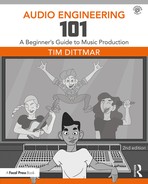p.x
Audio engineering is layered with many disciplines such as acoustics, physics, technology, art, psychology, electronics, and music. Each layer provides a new set of questions, answers, theories, and concepts. You soon realize that you will never know it all. This guide encompasses many aspects of audio engineering and includes a dose of reality. This is a hard business, but if you are willing to put forth the time and effort, you may end up with a job you love.
The goal of this book is to explain audio engineering and music production in an easy-to-understand guide. I wrote the first edition after ten years of teaching Audio Engineering courses at Austin Community College, two years of lecturing at the University of Texas, and twenty-five years of engineering and producing records. I decided to create a guide that draws on the lessons and experiences that have proved to be successful with both students and clients. As a Professor, I have unique insight into a beginner’s ability to retain technical information. Many audio engineering books are simply too overwhelming for those being introduced to recording and music production. This is a recurring point made by many students and is one of the inspirations for this book. Audio Engineering 101 explains intangible concepts that can make a recording better, such as understanding body language, creating a good vibe, and people skills. Much of your business will be generated by word of mouth, so these are important skills. In addition, the book highlights what to expect with internships, how to create a productive recording space, and an overview of what jobs are available to audio engineers. You will also find a handy guide dedicated to microphones and their uses. This is a great section for a true beginner or for the hobbyist wanting to learn microphone basics. Audio Engineering 101 includes FAQs (frequently asked questions) answered by a diverse group of professional recording engineers from around the country. Questions are answered by experienced pros: What is the first mic you should buy or how you can get your foot in the door.
You can’t learn everything about music production in a semester of school or even by getting a degree in the subject. Becoming proficient in music production may take many years. Experience is one of the most valued aspects of the profession and is gained by creating thousands of mixes, both good and bad, learning from your mistakes, and continually honing the craft. This is one of the coolest jobs you could ever have, but it won’t be easy becoming a true professional. Even if you decide not to become an audio engineer, this book will take some of the mystery and intimidation out of the studio and the recording process.
